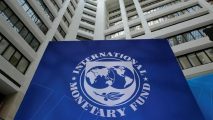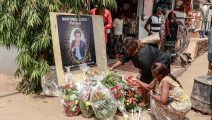Privacy Overview
This website uses cookies so that we can provide you with the best user experience possible. Cookie information is stored in your browser and performs functions such as recognising you when you return to our website and helping our team to understand which sections of the website you find most interesting and useful.

















3, May 2019
Cameroon’s Anglophone Crisis: How to Get to Talks? 0
After twenty months of clashes, the government and the separatists are both refusing to give ground. Both sides must explore compromise solutions aimed at a level of regional autonomy somewhere between the secession the separatists yearn for and the fake decentralisation proposed by Yaoundé.
What’s new? The conflict in the Anglophone regions of Cameroon is deadlocked. There is no dialogue between Yaoundé and the separatists, who are both refusing to give ground: the government is counting on a military victory and refuses to discuss the form of the state; the separatists demand independence.
Why does it matter? In the last 20 months, the conflict has left 1,850 dead, 530,000 internally displaced and tens of thousands of refugees. The intransigence of the belligerents threatens to generate further violence and prolong the conflict, which neither can win in the short term.
What should be done? Cameroonian and international actors should encourage the two sides to make concessions by threatening to sanction those who stand in the way of dialogue and rewarding the less intransigent. Ending the conflict will eventually require changes in the legal framework for decentralisation to grant greater autonomy to communes and regions.
Executive Summary
Cameroon’s Anglophone crisis is deadlocked. Twenty months of clashes have killed 1,850, displaced 530,000 and led tens of thousands to seek refuge abroad, but the government and the separatists are sticking to their irreconcilable positions. The separatists continue to dream that independence is just around the corner. In Yaoundé, the government still wrongly believes it can win a quick military victory. Meanwhile, moderates and federalists, who enjoy majority support, are unable to organise. To break the deadlock, Cameroonian and international actors should put pressure on the government and the separatists. Both sides must explore compromise solutions aimed at a level of regional autonomy somewhere between the secession desired by the separatists and the fake decentralisation proposed by Yaoundé.
The socio-political crisis that began in October 2016 in the Anglophone Northwest and Southwest regions mutated into armed conflict at the end of 2017. Seven armed militias are currently in positions of strength in most rural areas. The security forces reacted slowly, but since mid-2018 have inflicted casualties on the separatists. They have not been able, however, to regain full control over rural areas nor prevent repeated separatist attacks in the towns.
There is currently no dialogue between Yaoundé and the separatists. The latter are calling for talks to hammer out the practical details of independence in the presence of an international mediator. The government refuses to discuss the form of the state or reform of institutions. It proposes instead a decentralisation model that grants neither adequate funding nor sufficient powers to local authorities (communes and regions) and intends to organise the country’s first regional elections later this year. Far from resolving the conflict, this half-baked proposal risks provoking further violence.
Local initiatives to promote dialogue are emerging. In July 2018, Anglophone religious leaders (Catholic, Protestant and Muslim) announced a plan to hold an Anglophone General Conference as a first step toward an inclusive national dialogue. A majority of Anglophones are in favour of this initiative. Initially reluctant, some separatists now seem to be more open to the idea on condition that it prepares the way for a referendum on self-determination that would give the choice between federalism and independence. Faced with opposition from the government, the conference organisers have already had to postpone it twice: from August to November 2018 and then to March 2019. It still has not taken place.
Although some separatists will refuse to give ground, others might accept a dialogue with the Cameroonian authorities, in the presence of an international mediator, to discuss federalism or genuine decentralisation that would grant autonomy and adequate funding to the regions and that would guarantee respect for the specific features of the Anglophone judicial and education systems. Similarly, although the Cameroonian government seems to rule out federalism, it might consent to regionalism or genuine decentralisation, which would involve changes to the legislative framework.
To clear the path to talks, the belligerents must each make concessions in order to establish a minimum degree of trust and reverse the spiral of violence. The government should support an Anglophone General Conference in order for Anglophones to appoint representatives to a national dialogue while at the same time providing non-separatist Anglophones with the opportunity to express their point of view. Cameroon’s president should adopt a conciliatory stance and recognise the existence of the Anglophone problem and the legitimacy of the Anglophones’ demands; order investigations into abuses by the security forces; make provision for reparations to victims and the reconstruction of affected areas; and release the hundreds of Anglophone activists currently in detention, including important members of the separatist movement. The separatists should renounce their strategy of Monday “ghost towns” (general strikes) and their school boycott and expel combatants guilty of abuses against civilians.
A combination of internal and international pressures could lead both the government and the separatists to make such concessions. International actors could reward the parties who agree to moderate their positions and sanction those who remain intransigent. The Europeans and Americans, in particular, should consider targeted sanctions against government leaders and senior army officers who continue to obstruct dialogue (travel bans, asset freeze) and separatists who encourage or organise violence (judicial proceedings). The International Criminal Court prosecutor should open preliminary examinations into abuses committed by both sides, to underline that the pursuit of violence will have judicial consequences. International actors are divided, however, on what position to adopt and what measures to take and should first reach a common position, at least among Western countries.
Internally, Cameroonian Francophones and Anglophones who advocate compromise should mobilise to put pressure on the separatists and the government. In particular, federalists should work together to strengthen their position in the talks. They should continue to dialogue with the separatists and encourage them to moderate their positions, and increase the pressure on the authorities to open up to the less intransigent separatists. Finally, they should conduct an international campaign to promote peaceful solutions.
Once trust has been established, preliminary talks between government, federalist and separatist representatives will be necessary. These should take place outside the country. During this process, international actors, especially the U.S., Switzerland, the Vatican, the UN, the EU (especially France, Germany and the UK) and the African Union (AU) should continue to encourage the government to dialogue and offer funding and support for the talks.
In the event of a dialogue taking place, they could also help to fund compensation payments to victims of abuses, the reconstruction of Anglophone regions, the return of refugees and internally displaced persons and the disarmament and demobilisation of former combatants. Given the level of acrimony between the parties, the presence of an international mediator will be necessary during the preparatory discussions and then during the national dialogue. Several countries and international institutions and organisations have offered to mediate since the start of the conflict. The UN, the AU, the Catholic Church and Switzerland seem best placed to play this role, because the parties to the conflict perceive them as relatively neutral.
Substantive talks between the three parties should take place in Cameroon, which would require the government to guarantee safe passage for separatist representatives. During these talks, the government should indicate its readiness to amend the Constitution in order to grant greater autonomy to the regions and develop the legal framework for decentralisation. This could include direct elections for the regional councils and these councils’ presidents; the establishment of regional structures with substantial financial and administrative power; and an increase in the powers and resources allocated to communes. The government could also reform institutions and governance in order to take account of the specific features of the educational and judicial systems in the Anglophone regions.
More broadly, the conflict highlights the shortcomings of Cameroon’s centralised governance model and raises two crucial issues that the government must address: the need to improve the way the state handles minority rights, colonial heritages and cultural specificities; and the need for a fairer and more equitable redistribution of the country’s wealth. A lasting solution to the conflict requires dialogue and consensus, which are indispensable to undertake the institutional and governance reforms that Cameroon needs.
Source: International Crisis Group